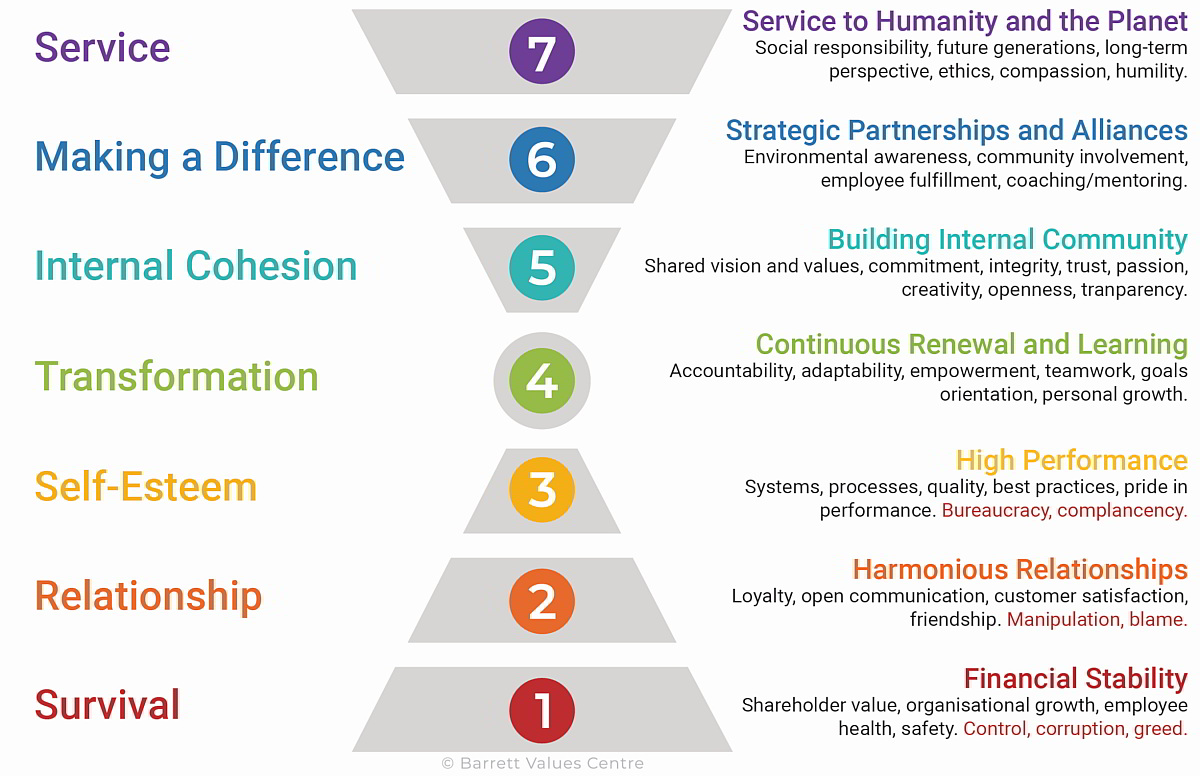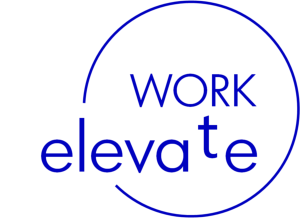
THE 7 LEVELS OF
Organizational Consciousness
Organizational Consciousness

Level 1: Survival Consciousness
The first need for an organization is financial survival. Without profits or access to a continuing stream of funds, organizations quickly perish. Every organization needs to make financial health a primary concern. When companies become too entrenched in survival consciousness, they develop an exclusive preoccupation with the bottom line and a deep-seeded insecurity about the future. They attempt to allay their fears through excessive control and territorial behavior. Businesses that operate from this level of consciousness are not interested in strategic alliances-takeovers are more their game.
They will purchase a company and plunder its assets. They see people and the Earth as resources to be exploited for gain.When asked to conform to regulations, they do the minimum. They have an attitude of begrudging compliance. Organizations experience their deepest fears at this level of consciousness.
Level 2: Relationship Consciousness
The second need for an organization is harmonious interpersonal relationships and good communications. Without good relationships with employees, customers and suppliers, company survival is compromised. However, when companies become too entrenched at this level of consciousness they place importance on relationships not for what they can give, but for what they can take. What they put into a relationship is purely based on what they think they will get back. Companies at this level tend to be strong on tradition and image, and weak on flexibility and entrepreneurship. Rules are important because there is little trust. They demand discipline and obedience from their employees. Family businesses tend to operate from relationship consciousness. This limits their ability to become successful because they are unable to trust outsiders in management positions.
Level 3: Self-esteem Consciousness
The third need for an organization is self-esteem. Self-esteem consciousness shows up in organizations as best practice and a desire for greatness. Organizations which operate from this level want to be the biggest or best at what they do. Consequently, they are very competitive and are constantly seeking ways to improve their cost effectiveness. Organizations at this level see management as a science. They focus on improving corporate fitness-productivity, efficiency, time management and quality control. They are ready to train their staff as long as the training can be seen to have a direct impact on the bottom line. Control is maintained through hierarchical power structures that often do little more than cater to the managers' needs for status, privilege and recognition. Companies that are predominantly focused at this level of consciousness can easily degenerate into bureaucracies. When this happens, failure or collapse will eventually occur unless the organization is able to embrace transformation.
Level 4: Transformation Consciousness
This is the bridge that companies must cross to create organizational cohesion and shift their belief systems from self-interest to the common good. The principal focus at this level of consciousness is self-knowledge and continuous-renewal. Organizations enter the process of transformation either because it is the next natural step in their evolution or because their viability is threatened. In either case the process begins with employee participation and involvement. Everyone is asked to take responsibility for making the business a success. Risk-taking is encouraged. During transformation, the culture of the organization shifts from control to trust, from punishment to incentives, from exploitation to ownership, and from fear to truth. Mechanisms are put in place to promote innovation and learning. The tyranny of the financial bottom line begins to disappear as organizations start to measure their success against a broader set of indicators.
Level 5: Internal Cohesion
The focus at this level of consciousness is internal connectedness. This is achieved through the development of a strong positive spirit with shared vision and values. By focusing on the needs of its people, the organization develops commitment and enthusiasm, and encourages higher levels of personal productivity and creativity. Values such as humor, transparency and passion become important. Failures become lessons, and work becomes fun. At this level of consciousness, organizations recognize the importance of employees finding meaning and purpose through their work. They encourage the alignment of their employees' personal motivations with the organization's vision and mission and support employees in becoming all they can become in terms of their professional and personal growth.
Level 6: Making a Difference
The main areas of focus at this level are external connectedness and an increase of internal connectedness through mentoring and coaching, and employee fulfillment. Partnerships are created with customers and suppliers, and the organization finds ways to support the local community. Organizations that embrace inclusion consciousness recognize the importance of strategic alliances, being respected members of the local community and good global citizens. They seek to support the local economy by collaborating with local businesses, and voluntarily addressing environmental and social concerns. They go beyond the letter of the law in dealing with their environmental responsibilities. They support employees in finding personal fulfillment at work and create opportunities for them to make a difference in the local community. At this level of consciousness organizations care for the whole employee-for their physical, emotional, mental and spiritual needs.
Level 7: Service
The primary focus of organizations at this level is service to humanity and the planet. They have a global vision. There is recognition of the interconnectedness of all life and the need for both individuals and institutions to take responsibility for the welfare of the whole. At this level of consciousness, organizations care deeply about ethics, justice, human rights, peace and the impact of present day actions on future generations-sustainable development. Social activism and consciously directed philanthropy become integral parts of their corporate strategy. They understand the importance of societal goodwill in building a successful organization. They observe the highest ethical principles and always consider the long term impacts of their decisions and actions. By taking a strong moral position, they are able to garner the respect and goodwill of their employees and society-at-large.
Distribution of Consciousness
Organizations do not operate from any one level of Organizations do not operate from any one specific level of consciousness. They tend to be clustered around three or four levels. Most organizations are focused in the lower three levels of consciousness-self-interest-profit and growth (Level 1), customer satisfaction (Level 2) and productivity, efficiency and quality (Level 3).
The most successful organizations that are among the 100 Best Companies to work for tend to be distributed across the full spectrum of consciousness with particular focus in the upper levels of consciousness-the common good-learning and innovation (Level 4), internal cohesion (Level 5), employee fulfillment, customer/supplier collaboration (Level 6) and ethics and social responsibility (Level 7).
Copyright © 1998 - 2001.
Cultural Transformation Tools® Barrett Values Centre
About ElevateWork
We are an international group of facilitators, trainers and coaches with a shared mission to elevate the world of work in collaboration with other like-minded, like-hearted leaders and organizations.
ElevateWork specializes in facilitating highly effective online meetings, holistic leadership mentoring and cultural change. Open Space Technology, Bohm Dialogue, online Open Space conferences, participative online meeting facilitation, Cohering Community, and facilitator training are our specialties.
